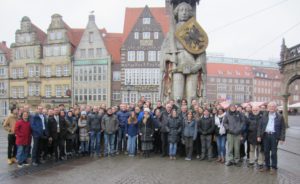Organizers: Tim O. Wehling (Bremen), Thomas Frauenheim (Bremen), Silke Biermann (Palaiseau Cedex), Johannes Lischner (London), Nikolay Prokofiev (Amherst, Massachusetts), Malte Schüler (Bremen), Andrew Millis (New York)
Venue: University of Bremen, Bremen Center for Computational Materials Science (BCCMS), Germany, 8th until 12th of October 2018
Sponsors: University of Bremen (BCCMS), Psi-k, DFG, CECAM
Electrons in real materials are subject to Coulomb interaction among each other. This interaction is long-ranged, gives rise to correlation effects, and often poses fundamental problems in ab initio simulations of real materials. A nowadays commonly used ab initio approach for strongly correlated materials is the augmentation of density functional (DFT) based methods with many-body treatments of the Hubbard model, such as the combination of DFT and dynamical mean field theory [1]. This approach, however, neglects all correlation effects stemming from non-local Coulomb interaction, since the Hubbard model only includes the on-site part of the interaction. Combining more sophisticated diagrammatic ab initio methods (GW) with methods and models which contain the long-range contributions of the interaction (EDMFT) [2] alleviates these problems in part but comes with the introduction of further approximations. Assessing the quality of such approaches is currently hampered by the fact that even the extended Hubbard model, which is the minimal many-body model capturing explicitly non-local interactions, is at best partially understood. Continue reading Report: CECAM / PSI-K Workshop Bremen on Correlated electron physics beyond the Hubbard model

